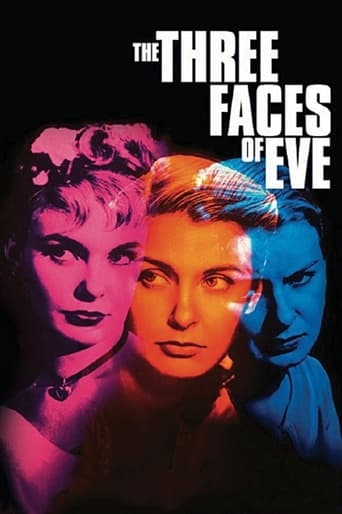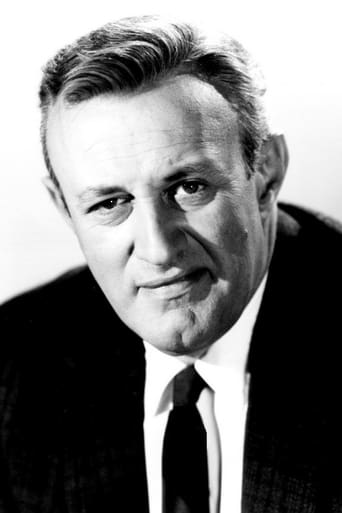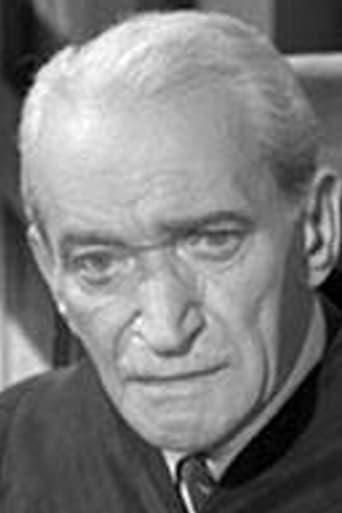Diagonaldi
Very well executed
ThiefHott
Too much of everything
Stephanie
There is, somehow, an interesting story here, as well as some good acting. There are also some good scenes
Fulke
Great example of an old-fashioned, pure-at-heart escapist event movie that doesn't pretend to be anything that it's not and has boat loads of fun being its own ludicrous self.
rodrig58
If you want more than an acting lesson, then this is the movie! I knew Joanne Woodward was a great actress from "The Effect of Gamma Rays on Man-in-the-Moon Marigolds." Here she goes beyond any limit of imagination, rightly they gave her an Oscar, they had to give her three Oscars. Lee J. Cobb, one of the actors I love, I know him from "The Exorcist", "The Liberation of LB Jones", "12 Angry Men", "On the Waterfront", "Mafia" Il giorno della civetta (original title). Here he's making another big role. David Wayne is also very good in the role of a simple, stupid husband. Absolutely to be seen! Especially by those who want to become actresses.
dougdoepke
Well, it took a while, but I finally caught up with the flick. Sixty-years ago, the story kicked up quite a fuss, what with older Hollywood reducing questions of multiple personality to Jekyll and Hyde. Here it gets almost clinical treatment, with the many sessions between therapist Dr. Luther (Cobb) and the afflicted Eve. No doubt about it, Woodward really delivers with tricky material that could easily have gone over the top, which comes close with strumpet Eve Black's wanton behavior.It helps that events reflect actual occurrences, otherwise some would be hard to believe. Note how, for example, Eve can eventually summon at will her different personalities. That seems too facile, and in other circumstances, would suggest a plot gimmick. But apparently it is fact. Also, can the root of her problem be reduced to that single traumatic occurrence, bad though it might be. I'm in no position to judge an authentic case history, but that too seems facile. Nonetheless, what they say about truth being stranger than fiction might well apply here.All in all, the movie holds up well, even though there's no action and little to attract the eye. Rather, Eve's unusual dilemma is humanized to a compelling degree that richly deserved an Oscar.
kenjha
Based on a true story, this film looks at the case of woman with multiple personality disorder. Woodward, in only her third film and her first lead role, won an Oscar and became a star with her fine performance here. Also good are Cobb as her psychiatrist and Wayne as her less-than-understanding husband. After starting with an interesting premise, the film tends to bog down in psychoanalysis. Too much time is spent on conversations between psychiatrist and patient, yet little insight is provided into the nature of the disorder. Furthermore, a complex disorder is presented as too simple, as is the final resolution.
Robert J. Maxwell
Joanne Woodward is the chronically fatigued, defeated, dull housewife, Eve White, dominated by her boorish husband, David Wayne, in 1950s Georgia. She has spells of forgetfulness and sees a shrink, Lee J. Cobb. One day, to Cobb's surprise, the personality of Eve White disappears under hypnosis and is replaced by the irresponsible, flirtatious playgirl who is called Eve Black. Eve has two separate and distinct personalities that take the public stage at various times. Eve Black knows about the existence of Eve White but not vice versa. Being the more clever of the two, Eve Black goes out secretly gallivanting around town and leaves Eve White with the hangovers. There's a lot of confusion. In the end, a third personality emerges and gets rid of the other two. The third is called Jane. She's mature, full of social graces, uses words like "controversial," and quotes Shakespeare's sonnets. Jane gets married and lives happily ever after.Freud called all of these dissociative conditions "hysteria," as did the Greeks, whose language the term is borrowed from. The aberrations were found mostly in women, as they are today, and were attributed to a wandering womb. No kidding.Freud clarified some of the nomenclature around the turn of the century and multiple personality was first identified and described by the American psychologist Morton Prince.Joanne Woodward does all the work in this movie. She won an Academy Award for her efforts and probably deserved it. It's not a great big tragic movie, but depends on subtle variations on a theme of Eve. Not an easy job. Woodward has to remain the same central person, but just tint the character enough to make it seem one way or the other.Lee J. Cobb lends stalwart support as the cigar-smoking shrink who is amazed -- amazed! -- to run into a multiple personality in his practice. He shouldn't be, not if he's an aware shrink. MPDs aren't that common but they're well-known because they're usually dramatic.The way they usually work is like this. (Lecturer unrolls ancient Egyptian papyrus and displays a flow chart.) There's a dull person. Sometime during childhood the dull person begins to have spells of reckless behavior and doesn't remember them. The dull person grows up accompanied by this second, thoroughly integrated personality, often assuming a different name, using different handwriting, and so forth. But, most often, the dull person is the one we meet in the supermarket. It's as if, inside the dull person, there's another one just DYING to get out. Probably most of us have a bunch of unintegrated nasty impulses buried inside us but we manage to stifle them because we recognize them as socially abjured. The multiple personality, in a sense, outwits herself and gets to have a lot of fun while never having to take responsibility for it. Better than that -- the reckless one has a ball and the dull one gets to become a sympathetic victim of the other. She (or he) gets to have her cake and eat it too.But -- here's the thing -- it's all UNCONSCIOUS. There isn't a single person figuring out how to avoid responsibility for misbehavior, not like an actor stepping out onto a stage, being Othello for a while, then going to his dressing room and shedding Othello's personality along with his costume.It may LOOK contrived but it's not. The different personalities don't know what's causing "this multiplied thing," as Eve White's husband calls it. Or -- maybe some are more aware than others. The Hillside Stranglers tried to use it as a defense. And I won't take the space to describe Ganser's Syndrome, but just suggest it's worth a look-see on Google or someplace if you're interested.I'm always tempted to get off the track with movies that deal with complicated issues like this, because the movies themselves tend to simplify it to an annoying extent. It all boils down to some hidden childhood trauma. Once that's discovered, all the problems disappear. It doesn't matter whether the movie is "The Three Faces of Eve" or "Marnie". That childhood experience provides a nifty dramatic structure -- the thing towards which the whole narrative is striving.In real life -- that is, as of now, not as of Freud's turn-of-the-century Vienna -- nothing is as simple as that, although the movies strive mightily to make it seem so. The real Eve later developed many more personalities. In some cases, there are dozens of them, each with different names and identities and characteristics. Old habits die hard.But I DID like the sonnet that Jane quotes: "Life's a city, full of strange streets, And Death's the marketplace where each one meets."Spot-on analogy, isn't it?







